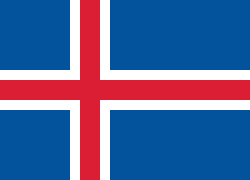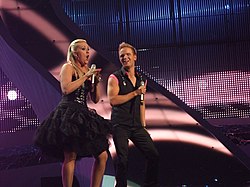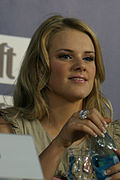Top Qs
Timeline
Chat
Perspective
Iceland in the Eurovision Song Contest
From Wikipedia, the free encyclopedia
Remove ads
Iceland has been represented at the Eurovision Song Contest 37 times since its debut in 1986. It has missed only two contests since then, in 1998 and 2002, when prevented from competing due to finishing outside qualification places the preceding years, and will skip the 2026 contest due to the inclusion of Israel in the context of the Gaza war. The country's best result is second place, which it achieved with "All Out of Luck" by Selma in 1999 and "Is It True?" by Yohanna in 2009. The Icelandic participating broadcaster in the contest is Ríkisútvarpið (RÚV), which select its entrant with the national competition Söngvakeppnin.
This article includes a list of general references, but it lacks sufficient corresponding inline citations. (January 2020) |
Iceland has achieved a total of seven top ten placements, with the others being "Eitt lag enn" by Stjórnin finishing fourth (1990), "Nei eða já" by Heart 2 Heart seventh (1992), "Open Your Heart" by Birgitta eighth (2003), "Hatrið mun sigra" by Hatari tenth (2019), and "10 Years" by Daði og Gagnamagnið fourth (2021). Since the introduction of the semi-final round in 2004, Iceland has failed to qualify for the final nine times, including four years consecutively (2015–18). To date, Iceland is the only Nordic country that has yet to win the contest.
Remove ads
History
Summarize
Perspective
Ríkisútvarpið (RÚV) is a full member of the European Broadcasting Union (EBU), thus eligible to participate in the Eurovision Song Contest. It has participated in the contest representing Iceland since its 31st edition in 1986, 20 years after RÚV was founded.
Iceland's best placing at the contest is second place, which it has achieved twice: in 1999 with the song "All Out of Luck" performed by Selma, beaten by Sweden's "Take Me to Your Heaven" by Charlotte Nilsson, and in 2009 with "Is It True?" performed by Yohanna, beaten by Norway's "Fairytale" by Alexander Rybak.
In contrast Iceland's worst result in a final is last place, which has been achieved twice to date: in 1989, when "Það sem enginn sér" by Daníel Ágúst received no points, and in 2001, when "Angel" by Two Tricky received three points.
With the introduction of semi-finals in 2004, Iceland automatically qualified for the final that year due to Birgitta's eighth place the previous year. In 2008, Iceland reached the final for the first time since then, with "This Is My Life" by Euroband. Iceland qualified for the final in seven consecutive contests between 2008 and 2014 before failing to qualify for the final from 2015 to 2018. In 2019, Hatari brought the country back to the final for the first time since 2014, finishing tenth, which was followed by a fourth-place finish for Daði og Gagnamagnið in 2021, Iceland's joint-second best result to date, and a 23rd-place finish for Systur in 2022. Further non-qualifications came in 2023 and 2024. VÆB brought the country back to the final in 2025 breaking the countries two year non qualification streak. They finished 25th in the final, receiving zero points by the juries. RÚV withdrew from 2026 due to Israel's inclusion.
Despite these mixed fortunes, Iceland is the second most successful country never to have won the contest (behind only Malta).
Sigríður Beinteinsdóttir has participated five times (as a member of a group in 1990 and 1992, as a solo artist in 1994, and as a background vocalist in 1991 and 2006). Hera Björk has also participated five times (as a backing vocalist in 2008, 2009 and 2015, and as a solo artist in 2010 and 2024). Stefán Hilmarsson has participated twice (as a member of a group in 1988 and in a duo with Eyfi in 1991), as have Selma Björnsdóttir (1999 and 2005), Eiríkur Hauksson (as a member of a group in 1986 and as a solo artist in 2007; Eiríkur has additionally participated for Norway in 1991 as a member of Just 4 Fun). Jón Jósep Snæbjörnsson entered as a solo artist in 2004 before participating in a duo with Greta Salóme Stefánsdóttir in 2012; Greta Salóme later entered as a solo artist in 2016.
Remove ads
Participation overview
| 1 | First place |
| 2 | Second place |
| 3 | Third place |
| ◁ | Last place |
| X | Entry selected but did not compete |
Remove ads
Related involvement
Summarize
Perspective
Conductors
Heads of delegation
Commentators and spokespersons
Iceland has broadcast the show since 1970. The first to be broadcast live was the 1983 edition after the plan to broadcast the 1982 contest failed. Since 1986, RÚV has broadcast the contest on the radio using same commentator for TV and radio and the Internet broadcast since early 2000s.
Other shows
Remove ads
Photo gallery
- Eiríkur Hauksson in Helsinki (2007)
- Hera Björk in Oslo (2010)
- Eythor Ingi in Malmö (2013)
- María Ólafs in Vienna (2015)
- Greta Salóme in Stockholm (2016)
- Ari Ólafsson in Lisbon (2018)
- Hera Björk in Malmö (2024)
Remove ads
In popular culture
The 2020 Netflix comedy film Eurovision Song Contest: The Story of Fire Saga stars Will Ferrell and Rachel McAdams, who portray a fictional duo from Iceland competing in Eurovision. Hannes Óli Ágústsson, who plays Olaf Yohansson in the film, reprised his role for the voting segment of the 2021 contest final, in which he presented the points on behalf of the Icelandic jury.[111]
Notes
- According to the then-Eurovision rules, the top ten non-Big Four countries from the previous year along with the Big Four automatically qualified for the Grand Final without having to compete in semi-finals. For example, if Germany and France placed inside the top ten, the 11th and 12th spots were advanced to next year's Grand Final along with all countries ranked in the top ten.
- The 2020 contest was cancelled due to the COVID-19 pandemic.
- All conductors are of Icelandic nationality unless otherwise noted.
- Conducted by Þórir Baldursson at the national final.
- Conducted by Vilhjálmur Guðjónsson in the national final.
- Conducted by Jón Ólafsson in the national final.
- Icelandic commentary
- English commentary for the semi-finals; Icelandic commentary with Icelandic Sign Language interpretation for the final
- English commentary
- English commentary for the semi-finals; Icelandic Sign Language interpretation by Elsa G. Björnsdóttir for the final
- As Olaf Yohansson from Eurovision Song Contest: The Story of Fire Saga
- Icelandic Sign Language interpretation
Remove ads
References
Wikiwand - on
Seamless Wikipedia browsing. On steroids.
Remove ads

















